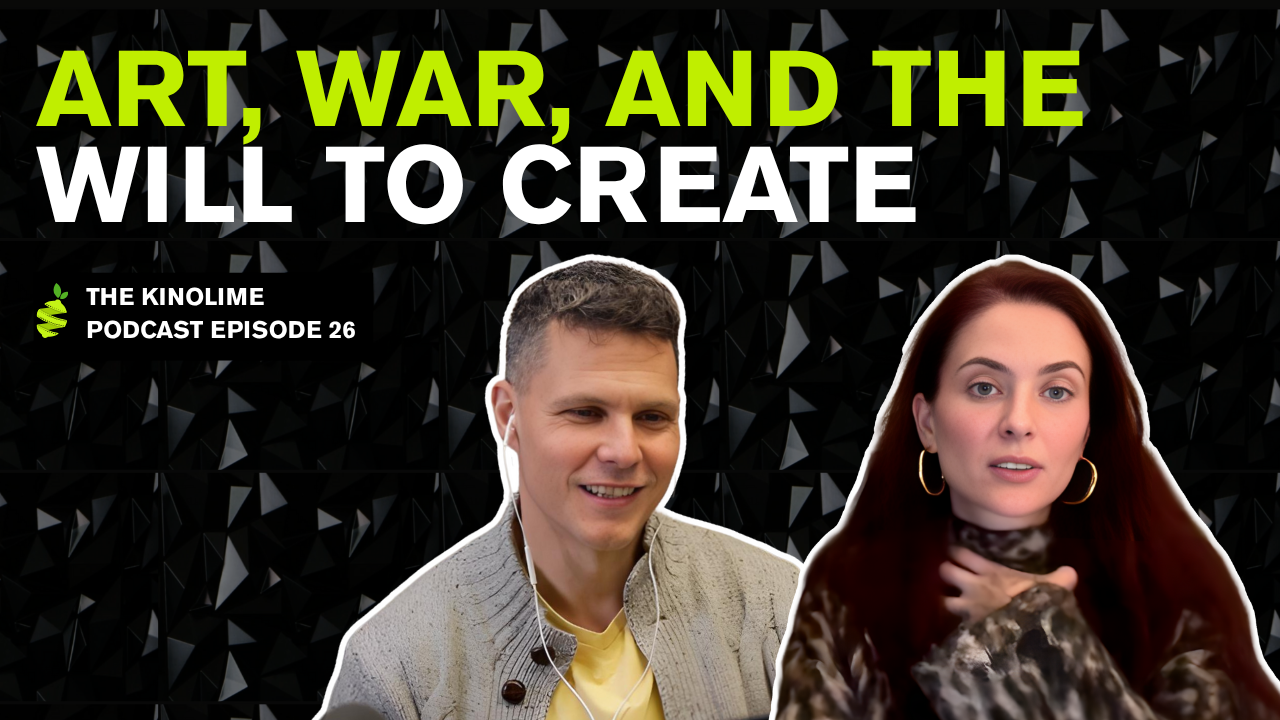Filmmaking in War: Alice Biletska & Our House Is on Fire [Podcast]
In this powerful conversation, director Alice Biletska sits down with John to share the making of Our House Is on Fire, a Kinolime production and one of the first narrative films shot in Ukraine during the full-scale invasion. Alice reflects on leaving LA to return home, creating art under bombings and curfews, and the questions that shaped the film: Why tell stories when the world is collapsing? What endures when everything else falls away? Together, they explore how cinema can witness, heal, and illuminate resilience, love, and humanity in the darkest moments.
Full Transcript: Kinolime Podcast Episode 26: Filmmaking in War: Alice Biletska & Our House Is on Fire
Participants
John Schramm - Head of Development, Kinolime
Alice Biletska - Filmmaker, Director Of Our House Is On Fire
John:
Alice, thank you so much for being here. I want to start with something you said early on: that during the shoot you kept asking yourselves, What are we? Why are we telling stories in a time like this? Can you talk about that?
Alice:
It was a big question for all of us. When such horrendous events are happening, you wonder: is telling stories important, or is it indulgent? But everyone on set knew exactly why they were there. We felt the urgency to share this story with the world, to show resilience, love, how war changes you, and who you become when you face evil.
We weren’t just telling the story; we were living it.
Alice’s Path to Filmmaking
John:
Your background isn’t traditionally “film school first.” How did you get here?
Alice:
I wanted to make films since childhood, but my dad insisted I’d end up broke, so I got a finance degree, then art history. I tried everything: journalism, curating, art. But filmmaking was the only thing that actually felt right.
When the war started in 2014, I realized I couldn’t ignore it anymore. I made short films, studied theatre in Paris, returned to Ukraine, and kept creating. Eventually, I became the first Ukrainian director admitted to AFI in LA.
Writing the Film During the Invasion
John:
Let’s talk about Our House Is on Fire. This film was written in extreme circumstances.
Alice:
Yes. When the full-scale invasion began in 2022, I was in LA, devastated. I couldn’t take any job unrelated to Ukraine. So I wrote a script set during the war. Logically, it made no sense, who would finance it? But it was the only thing I could do.
Then I met producer Brian Perkins, told him I wanted to go back and shoot in Ukraine. He connected with Danny, Oleg, Ezrael, and the team, and they said, “Let’s do it.” There was no insurance, nothing, but we went.
Shooting Our House Is on Fire During the War
John:
You shot under conditions most filmmakers can’t imagine.
Alice:
It was early 2023, bombs, curfews, no electricity. Our production design team was stuck on location during curfew. Bombs fell 500 meters away.
We normalized everything because we had to: nights of bombing, no sleep, then waking up at five, checking if everyone was alive, and heading to set. Someone constantly monitored missile types and air-raid alerts. At the time, you just survive it. Later you think, That was insane.
How War Changes a Filmmaker
John:
How did this experience change you creatively?
Alice:
It clarified what’s truly important. A lot of films now feel disconnected from reality. Characters often behave in ways that feel… infantile compared to real human struggle.
I believe cinema must either reflect the world or help us survive it. After the invasion, I didn’t watch films for a year. Now I gravitate toward stories about transformation, hope, humanity.
Ukrainian Cinema and Cultural Diplomacy
John:
Documentaries from Ukraine are getting global recognition, but fiction seems harder right now.
Alice:
Documentaries are thriving. But narrative filmmaking is almost impossible without state funding, and all funding understandably goes to urgent needs. Meanwhile, Russia is pumping out propaganda films worldwide.
Ukraine needs strong cultural diplomacy. We have outstanding filmmakers, but supporting fiction has become very complicated.
Why Fiction Still Matters
John:
Why does telling fictional stories about war still matter?
Alice:
People in the West feel fatigued by “war news.” Fiction cuts through that. Viewers emotionally invest in characters and then ask themselves, What would I do if this happened to my family?
The more people ask that question, the better it is for the world.
The Kyiv Premiere
John:
How was it showing the film in Kyiv?
Alice:
Overwhelming. I was too nervous to watch it with the audience. None of us expected we’d still be at war when the film screened in 2025, we thought Ukraine would have won.
The feedback was deeply emotional. Some viewers found it cathartic; others said it was almost too hard to watch. But Kyiv welcomed us warmly. It meant so much to the whole team.
Current Projects
John:
What are you working on now?
Alice:
I’m finishing a book, magical realism, still connected to the war. Each door the protagonist opens leads to a different version of herself and a different phase of the war. Brutal, mystical, honest.
And I have a few film projects in development I can’t reveal yet.
What Alice Learned
John:
You’ve said this film “killed you a few times.” What did you take away from it?
Alice:
Making a film is brutal and beautiful. You die and resurrect over and over. I even kept a notebook of everything I learned, mistakes in pre-production, production, post-production.
My advice:
Know why your story matters. Surround yourself with people who support you but also challenge you. Learn constantly. And don’t die for your film, not even your hair.
John:
Alice, thank you for sharing your story so openly.
Alice:
Thank you for having me and asking such thoughtful questions.

